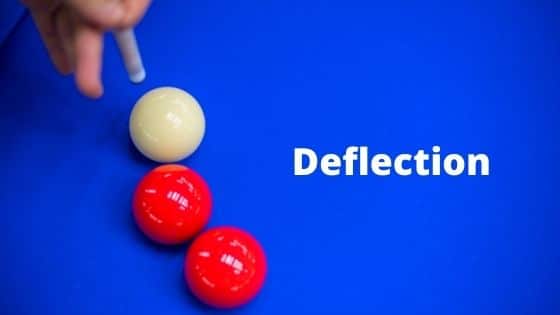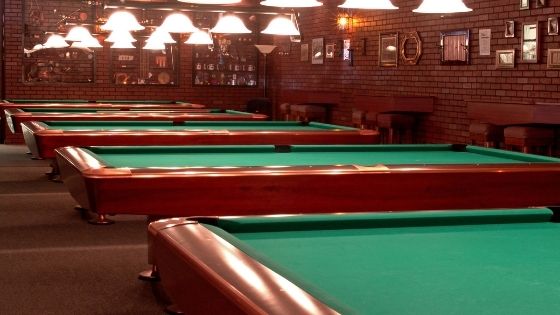If you’ve just recently started playing the game of pool or billiards as some people call it – congratulations!
Welcome to a sport that will bring you endless hours of fun and joy whether you’re practicing solo or playing in a social setting, like the local bar, the pool house or even a friend’s home.
Best Cues for Beginner Pool Players.
The best pool cue for beginners would be 58 inches long, two-piece wooden construction, with a low deflection shaft, weighing approximately 19 ounces, with medium tip, costing less than $300.
Why Would You Need Your Own Pool Cue?
There’s one slight issue, however, and that is the fact that when you go out to play pool, you’re more than likely to use the in-house cues that the particular venue offers to all their patrons.
Now – there’s absolutely nothing wrong with using those cues when you’re planning to just knock some balls around the pool table. However, if you’re planning to take the sport more seriously, it’s probably best for you to invest in some proper equipment.
In order to progress and help you get the most out of your game. The first thing on that investment list? The humble pool cue.
What Qualities Should You Look For?
When choosing a pool cue, there are several things to look out for. What is your budget? What is it made out of? Do you want a two-piece screw-in two-piece cue or a one-piece?
Is it worth getting one custom made for yourself?
We break down all of these factors below – read on to find out more.
What Cues Should You Avoid?
This is a good question. Whilst it is probably true that the top ten professional players in the world could play with a broom handle or a rolled-up newspaper, it is also true that they would not be playing pool at their best.
You get what you pay for is also true with pool cues. One good pool cue could last you a lifetime. So with that being said, try to avoid cheap, big box pool cues if you can.
You may end up paying more in the long run because of the poor quality that is often found on those cues.
How Much Should You Expect To Pay?
More often than not for beginner players, budget is one of the top concerns when it comes to investing in their very first pool cue. And for good reason too – it is after all the first big investment you’re making into this new sport that you’ve become passionate about, and you don’t want to end up buying something that will give you a bad experience in the long run.
Set a budget to purchase your first personal pool cue. There are hundreds of options on the market at various price points from $25 to several thousand dollars.
Remember that you don’t have to break the bank in order to get the most out of your abilities – professionals get to where they are through years of practice, and that’s the only thing that really matters. The choice of cue comes second to that!
As a guide, all good beginner pool cues would cost you around $250 to $400, and professional level pool cues will set you back around $1000 or more.
What Are You Paying For In A Pool Cue?
You are paying for materials, craftsmanship and reputation.
These are your choices:
- Low end, mass-produced cues from Taiwan etc.
- Production pool cues made by respected producers.
- Production cues with added new technology shafts.
- Custom cues hand made to order by craftsman cue makers.
It is my opinion that the addition of exotic woods and expensive materials, whilst looking absolutely fantastic, does little to add to the playability of a pool cue.
Beyond around $900, you are paying for looks, craftsmanship and reputation.
I’ve always wanted a Southwest pool cue, I hit a couple of balls with one once and it felt really good. I can’t actually put it into words but I just liked it.
Southwest cues, for instance, cost $3000+ to buy used. There is a long waiting list for new cues to be made and plenty of buyers willing to wait years for one.
Construction Material Choices Are Important.
Pool cues are crafted pieces made out of a mixture of materials. You have several parts that make up a pool cue – namely, the shaft, the tip, the joint and the wrap.
The Shaft.
Wooden Shafts
The shaft is commonly made out of wood – specifically North American Grade “A” Hard Rock Maple for the good quality ones. This is because the grade A maple gives the best balance of flexibility, feel and durability.
Those qualities are important to serious pool players.
Carbon Fiber Shafts.
These shafts are made from a new material that is growing in popularity. Carbon fiber shafts are usually low deflection and fairly expensive going for around $450 plus for a name brand.
The Butt.
The cue butt is the part of the cue which is held by the player. Usually made from wood, it has a screw joint, houses the weight bolts and contains most of the cost of the cue.
Cue butts can be made of cheap wooden scraps at one end of the spectrum and expensive exotic woods and precious metal at the other.
What Type Of Tip Should You Get?
The tip is what hits the cue ball during the game, which makes it one of the most important parts of the pool cue. Pool cue tips are usually made from leather that is layered together using compression and glue.
There are different hardness options to choose from when it comes to tips – soft tips hold chalk better, which reduces the risk of miscues, whereas harder tips don’t hold chalk as well, which slightly reduces accuracy if you don’t reapply chalk often during your game.
Medium hardness tips are the best of both worlds – more often than not, this is the go-to choice for most beginners.
Choice Of Joint.
For two-piece pool cues, the joint is an important part which connects the butt and the shaft together to form a full sized cue. The joint usually comes in the form of a 5/16 x 18 pin or a ⅜ x 10 pin, which allows for upgrading of shafts when you progress in skill. The joint itself is usually a high quality brass joint, unlike the early days where wood and plastic were used. A brass joint keeps the cue straight and is a highly long-lasting material.
What Type Of Grip Is Best?
The grip, or wrap, is where you hold your pool cue when taking the shot. It can be made out of nylon, leather, rubber , silicone or linen. Some players also choose to have pool cues without any wraps, leaving just the finished wood as the grip. Pool cue grip is a highly personalized thing, and we recommend trying out all styles before you come to one that you’re most comfortable with.
One Piece Or Two Piece Construction?
Should I choose a one-piece or a two-piece pool cue? In the world of cuesports, many players prefer to use one-piece cues because of the fact that it is in one solid piece, which allows for greater feel and power when it comes to hitting the cue ball during a game.
However, they are more cumbersome to transport, and you’ll probably find yourself struggling to fit them into your car when you’re off to play a couple of games somewhere.
Two-piece cues are more convenient to keep, store and transport. If ease of transport and convenience are strong factors for you, the two-piece pool cue is the way to go, especially as a beginner.
Custom Or Production Pool Cue?
Custom pool cues are highly sought after because of the way they are made – in limited quantities, using exotic wood and with top quality craftsmanship that takes hundreds of man hours to complete. They are regarded as highly functional cuesports equipment that can be equally regarded as collectible works of art.
Showing off your custom pool cue, with its intricate designs and high-quality craftsmanship tells others around you that you’re not messing about. However, the prices of such cues can be pretty prohibitive for beginners, even for semi-pros. It’s best to evaluate whether it’s worth investing in such high-quality equipment before you write that check – and whether it matches your ability level, too!
Production cues are mass-produced, but still of a substantial enough quality to ensure that serious pool players can improve, game by game. We recommend sticking to production if you’re a beginner – custom pool cues can come later when you’re 100% sure your investment is going to be worth it.
Should A Beginner Choose A Wood Or Carbon Fiber Shaft?
Thanks to new manufacturing technology, carbon fiber has changed the world of cuesports in unprecedented ways. The newer carbon fiber shafts have leveraged the strength and durability of the material, with the flexibility and light weight that feels just natural for the professional and amateur pool player alike.
The aerospace-grade carbon fiber that is used eliminates vibration when hitting the cue ball while providing enough balance and consistent performance for a lifetime, thanks to its non-warping or wearing ability.
That’s not to say that wooden pool cues aren’t still popular – they definitely are, and this is one of the hard choices you’ll make as a beginner pool player.
Which Cue Makers Make Good Quality Cues?
Some of the most popular brands of pool cues today include:
- Predator
- Players
- Meucci
- Cuetec
- Viking
- Pechauer
- Jacoby
These pool cue manufacturers have a great range of high-performance pool cues to suit every price range.
Best Pool Cue Weight For Beginners?
Here we are just talking about playing cues only which can vary in weight between 16 ounces and 21 ounces. The average weight is 19 ounces.
Most cues today have a weight system that is adjustable. Weight kits can be bought from the cue manufacturer or in some cases they come complete with the purchase of the cue.
Cue weight affects balance and acceleration. Go with what feels good but a cue around 19 ounces would be a good choice.
New or Used Pool Cues.
Another option is to see if you can get a good quality pool cue that is used. Check online marketplaces such as Facebook marketplace, Ebay or Craigslist to see if your local area or city has any used pool cues for sale.
Because of the hardy nature and construction of good quality pool cues from reputable companies like the ones mentioned above, they tend to last for a lifetime if they are well taken care of and maintained regularly.
You’ll be surprised at the great deals you can find on used pool cues, and who knows – you might find a bargain in the form of a beautifully made and intricately designed custom cue for a great price!
Another plus of buying a used cue is that it should keep the price down some.
Used cues are a little cheaper usually unless they are a collector’s item.
What About Buying A Sneaky Pete?
Last but by no means least you could purchase what is called a Sneaky Pete.
This is a great pool cue made by the above manufacturers which is made to look like a $10 one piece house cue. They are made from good materials but have none of the fancy extras. The butt is a plain splice and there is a wood to wood joint.
They play “as good” as any production cue and all of the above manufacturers usually produce them. Sneaky Petes are usually cheaper than the other cues in the same range but they play as good.
You could put any shaft on one of these cues even a low deflection shaft and any tip that you could want.
Conclusions
But more often than not, it is true that a well-made personal pool cue well outperforms the standard house cue at a pool hall or at the local bar.
Your personal pool cue will have the benefit of being well maintained, kept and stored properly and used regularly by only you – house cues are subject to questionable forms of abuse (after all, they are used by hundreds of people every week).
Your pool cue can last a lifetime if you look after it with respect.
So to answer the question – “do you need your own pool cue?” – yes, and if you’re serious about the sport, it doesn’t take a huge investment either for a good quality intermediate cue!



